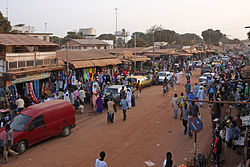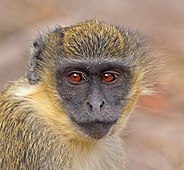The Gambia
The Gambia, officially the Republic of The Gambia, is a country in West Africa.[a][8] Geographically, The Gambia is the smallest country in continental Africa;[b] it is surrounded by Senegal, except for its western coast on the Atlantic Ocean.[9] It is situated on both sides of the lower reaches of the Gambia River, which flows through the centre of the country and empties into the Atlantic Ocean. The national namesake river demarcates the elongated shape of the country, which has an area of 11,300 square kilometres (4,400 sq mi) and a population of 2,468,569 people in 2024.[4] The capital city is Banjul, which has the most extensive metropolitan area in the country;[10] the second- and third-largest cities are Serekunda and Brikama.[11]
This article is about the modern state. For its predecessor, see The Gambia (1965–1970).
Republic of The Gambia
- 96.4% Islam
- 3.5% Christianity
- 0.1% others
18 February 1965
30 September 1989
11.5
176.1/km2 (456.1/sq mi) (74th)
2023 estimate
2023 estimate
![]() 35.9[6]
35.9[6]
medium
$_$_$DEEZ_NUTS#2__answer--9DEEZ_NUTS$_$_$
right
Arab Muslim merchants traded with native West Africans in The Gambia throughout the 9th and 10th centuries. In 1455, the Portuguese were the first Europeans to enter The Gambia, although they never established significant trade there.[12] The region was made a part of the British Empire by establishment of a colony in 1765,[13] and exactly 200 years later, in 1965, The Gambia gained independence under the leadership of Dawda Jawara. Jawara ruled until Yahya Jammeh seized power in a bloodless 1994 coup, with Jammeh ruling until 2017. Adama Barrow became The Gambia's third president in January 2017, after defeating Jammeh in the December 2016 elections.[14] Jammeh initially accepted the results, but then refused to leave office, triggering a constitutional crisis and military intervention by the Economic Community of West African States that resulted in his removal two days after his term was initially scheduled to end.[15][16][17]
The Gambia has been a member of the Economic Community of West African States since its conception in 1975 and is a member of the Commonwealth,[18] with English being the country's sole official language, both legacies of its British colonial past. The Gambia's economy is dominated by farming, fishing, and especially tourism. In 2015, 48.6% of the population lived in poverty.[19] In rural areas, poverty was even more widespread, at almost 70%.[19]
Etymology[edit]
The name "Gambia" is derived from the Mandinka term Kambra/Kambaa, meaning the Gambia River (or possibly from the sacred Serer Gamba,[20] a special type of calabash beaten when a Serer elder dies).[21] Upon independence in 1965, the country used the name The Gambia. Following the proclamation of a republic in 1970, the long-form name of the country became Republic of The Gambia.[22] The administration of Yahya Jammeh changed the long-form name to Islamic Republic of The Gambia in December 2015.[23] On 29 January 2017 President Adama Barrow changed the name back to Republic of The Gambia.[24][25]
The Gambia is one of a small number of countries for which the definite article is commonly used in its English-language name and where the name is not either plural or descriptive (e.g. "the Philippines" or "the United Kingdom").[26] The article is also officially used by the country's government and by international bodies. The article was originally used because the region was named after "The Gambia [River]". In 1964, shortly prior to the country's independence, the Prime Minister Dawda Jawara wrote to the Permanent Committee on Geographical Names for British Official Use requesting that the name The Gambia retain the definite article, in part to reduce confusion with Zambia which had also recently become independent.[27]
The Gambia has a liberal, market-based economy characterised by traditional subsistence agriculture, a historic reliance on groundnuts (peanuts) for export earnings, a re-export trade built up around its ocean port, low import duties, minimal administrative procedures, a fluctuating exchange rate with no exchange controls, and a significant tourism industry.[77]
The World Bank pegged Gambian GDP for 2018 at US$1,624M; the International Monetary Fund put it at US$977M for 2011.
From 2006 to 2012, The Gambian economy grew annually at a rate of 5–6% of GDP.[94]
Agriculture accounts for roughly 30% of the gross domestic product (GDP) and employs about 70% of the labour force. Within agriculture, peanut production accounts for 6.9% of GDP, other crops 8.3%, livestock 5.3%, fishing 1.8%, and forestry 0.5%. Industry accounts for about 8% of GDP and services around 58%. The limited amount of manufacturing is primarily agricultural-based (e.g., peanut processing, bakeries, a brewery, and a tannery). Other manufacturing activities involve soap, soft drinks, and clothing.[77]
Previously, the United Kingdom and the EU constituted the major Gambian export markets. However, in recent years Senegal, the United States, and Japan have become significant trade partners of The Gambia. In Africa, Senegal represented the biggest trade partner of The Gambia in 2007, which is a defining contrast to previous years that had Guinea-Bissau and Ghana as equally important trade partners. Globally, Denmark, the United States, and China have become important source countries for Gambian imports. The UK, Germany, Ivory Coast, and the Netherlands also provide a fair share of Gambian imports. The Gambian trade deficit for 2007 was $331 million.[77]
In May 2009 twelve commercial banks existed in The Gambia, including one Islamic bank. The oldest of these, Standard Chartered Bank, dates its presence back to the entry in 1894 of what shortly thereafter became the Bank of British West Africa. In 2005 the Switzerland-based banking group International Commercial Bank established a subsidiary and now has four branches in the country. In 2007 Nigeria's Access Bank established a subsidiary that now has four branches in the country, in addition to its head office; the bank has pledged to open four more. 2008 saw the incorporation of Zenith Bank (Gambia) Limited, a subsidiary of Nigeria's behemoth Zenith Bank Plc, in the country. In May 2009 the Lebanese Canadian Bank opened a subsidiary called Prime Bank.[95]
Since 2017, China has invested in Gambia as part of its Belt and Road Initiative. A major focus of Chinese activity in Gambia has been processing of locally caught fish for the production of fish meal for export. The economic and environmental impacts of fish meal production in Gambia are controversial.[96]
In 2024, the first solar power plant was inaugurated.[97]


